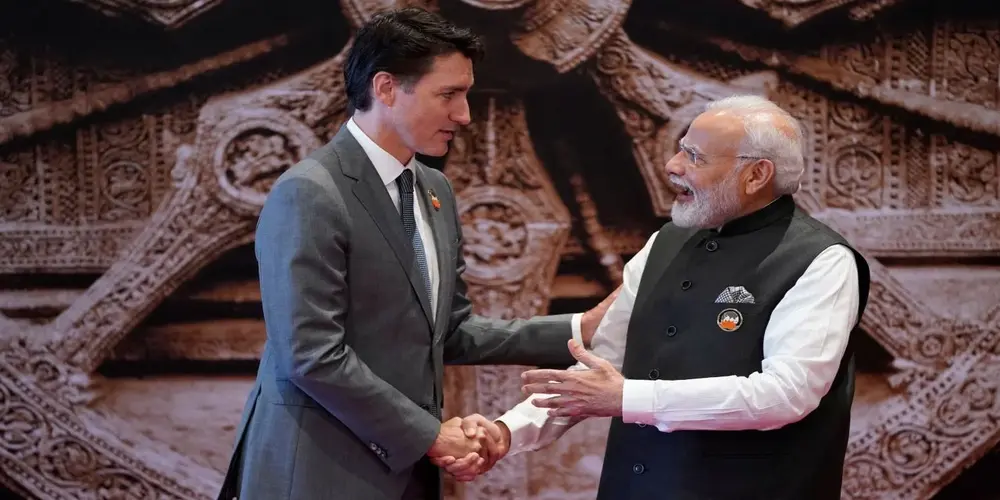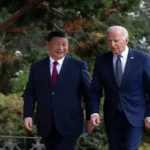The Diplomatic Standoff between India and Canada shows no signs of abating. While India has refrained from setting a deadline, its determination to reduce Canada’s diplomatic presence in the country remains firm. This ongoing confrontation stems from Canadian accusations implicating India in killing a Sikh separatist leader in suburban Vancouver, an assertion that New Delhi has vehemently dismissed as absurd.
The Diplomatic Stalemate
India’s External Affairs Ministry spokesperson, Arindam Bagchi, addressed the situation during a recent news conference, emphasizing that both countries are engaged in discussions regarding the “modalities on achieving” parity regarding diplomatic representation. However, specific details of these conversations were not disclosed.

India's External Affairs Ministry spokesperson, Arindam Bagchi
Earlier this week, a Canadian official revealed that India had requested the removal of 41 of the 62 Canadian diplomats stationed there. Bagchi did not respond directly when asked if Canada had provided credible evidence to support its accusations. Instead, he reiterated India’s willingness to examine any “relevant and specific” information that Canada might present.
Additionally, India has canceled visas for Canadians, a move Canada has not retaliated against. Previously, India had expelled a senior Canadian diplomat in response to Canada’s expulsion of a senior Indian diplomat.
Canadian Prime Minister Justin Trudeau has attempted to de-escalate the diplomatic clash by stating that Canada has no intention of provoking or escalating the situation.
A History of Tensions
The current standoff is not an isolated incident but the culmination of years of tensions between the two nations. India has long accused Canada of tolerating Sikh separatists who advocate for the creation of “Khalistan,” a separate Sikh nation in India’s northern Punjab state.
Arindam Bagchi stressed the need for Canada to improve the security situation for Indian diplomats in the country. New Delhi has argued that Indian diplomats in Canada face safety risks while commuting to and from their diplomatic missions due to a perceived climate of fear created by Sikh separatist groups.
Trudeau’s assertion last month that there were “credible allegations” of Indian involvement in the killing of Hardeep Singh Nijjar, a 45-year-old Sikh leader assassinated by masked gunmen in Surrey, outside Vancouver, further strained relations. For years, India had accused Nijjar, a Canadian citizen of Indian origin, of having links to terrorism, a claim Nijjar had consistently denied.
Disinformation Concerns
Amid this diplomatic standoff, the U.S. State Department has raised concerns about the potential for disinformation efforts targeting the Canada-India dispute. James Rubin, the Global Engagement Center’s co-ordinator, highlighted Canada’s vulnerability to disinformation campaigns, not only from within India but also from external actors.
"These various tactics are serious and concerted effort to interfere with democratic activity in Canada, and leave millions of Canadians at risk of being intimidated, coerced, silenced, and unable to enjoy the basic democratic rights and freedoms guaranteed in the Charter of… pic.twitter.com/lx8nDTCIlW
— Michael Chong 🇨🇦 (@MichaelChongMP) September 12, 2023
A recent report from the center detailed China’s extensive efforts to dominate the global information space, including within Canada. The report cited how Chinese operatives had used the WeChat messaging platform to attempt to discredit Ontario MP Michael Chong earlier this year.
A Shifting Diplomatic Landscape
Shifts in diplomatic approach have marked the Trudeau government’s response to India’s expulsion of Canadian diplomats. Initially, Trudeau had publicly accused India of complicity in the murder of Hardeep Singh Nijjar, an allegation made without concrete evidence.
It looks like conflict between Canada and India is escalating not deescalating but make no mistake about it, this is a conflict between US and India where Canada is just a pawn, front for US. https://t.co/cLTwAZqmgr pic.twitter.com/AkDUazHbCI
— 🇪🇺 🇲🇨🇨🇭Dan Popescu 🇫🇷🇮🇹🇷🇴 (@PopescuCo) October 6, 2023
However, in a surprising about-face, Canada’s Foreign Minister Melanie Joly called for private diplomatic talks, asserting the importance of keeping such conversations confidential. Just two weeks after the initial accusations, this shift in approach has raised questions about Canada’s handling of the situation.
The diplomatic tensions have not only strained relations but also had practical consequences. India’s decision to stop issuing new visas to Canadians affects tourists and Canadians looking to travel for family events, such as weddings, in India. Additionally, the expulsion of Canadian diplomats reduces Canada’s capacity to assist its citizens in India and advocate on business and consular matters.
Despite diplomatic challenges, Canada’s allies have continued to engage with India, urging cooperation while expressing concerns about the allegations. The situation remains fluid, and both countries must seek a resolution and restore amicable relations to prevent further fallout. The stakes are high, and finding common ground is essential for the mutual benefit of both India and Canada.




